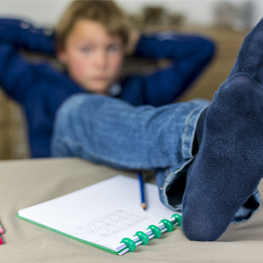
When it comes to schoolwork, parents often put up with their children’s procrastinating habits. Instead of encouraging good homework strategies, we allow distracted effort or inaction. But if we teach our kids to overcome the temptation of procrastination, we give them a valuable skill that reaches into adulthood. Here are a few strategies to help your children complete their homework assignments without delay:
Determine your child’s most productive period
Parents often insist that children complete their homework immediately after school to prevent distractions from interfering with finishing the work later. However, it might not be the most productive time for your child to do their homework, which encourages procrastinating.
Talk with your child about how they feel when they come home from school. Does your child need a snack break? Do they want to shoot the basketball first? Do they want to immediately start their homework to allow more time to play later without having to think about their assignments?
Be clear with your expectations. If your child doesn’t immediately start their task, make sure they understand why they’re allowed a break (so they will be more productive later) and how much time they have before they must begin the task of doing homework.
Consider the ‘why’
Is there a legitimate reason why your child hasn’t started their assignment? Does your child have all of the resources needed to complete the assignment? Is there a clear goal in mind? Does your child need some organizational help to get started? Do they have a quiet place to work?
Every child has different needs, and we help our children succeed when we provide them with what they need to accomplish the task at hand. That doesn’t mean we dive in and tackle the assignment with them, but it might mean we take them to the store to buy the necessary supplies so they can get started.
Break it down
It’s easy to procrastinate when a task appears overwhelming. Recently, our son had an assignment that required multiple tasks to complete the finished product. When he looked at the project all at once, he became overwhelmed with the amount of work he had to do. I helped him put together a step-by-step outline to proceed to the goal, which empowered him to tackle the assignment.
Slicing large projects into smaller assignments makes them more manageable to complete and less likely your child will procrastinate.
Discourage perfectionism
Striving for perfection on every assignment and every test leads to stress and encourages procrastinating habits. When a child thinks they must make the mark of 100 per cent on every assignment, they have less motivation to even begin. Be realistic with your expectations, particularly in the early years as children are adjusting to new routines. We want our kids to enjoy school and the privilege of learning, not labor over perfect grades.
Set a timer when necessary
When our son is having a particularly hard time settling into an assignment, we determine together how long he must sit and work and then I set a timer. When he knows he gets a break after a predetermined time, he more easily commits to beginning the work. A timer is a great tool to help kids develop consistent study habits as they get older and need to commit to longer periods of study.
Maintain a balanced routine
If we allow our children to participate in every sport, music, drama, and school activity that occurs, we create an unmanageable schedule with little time left over. When our children can’t visualize the satisfaction of completing a task when they begin, it’s likely they won’t want to start. Ask your children what activities interest them most and prioritize their desires to create a schedule that allows time to start and complete other tasks, as well. Rearrange the schedule as necessary to maintain balance.
Model good habits
Avoid procrastination in your everyday routine. Our children watch our behavior and copy what we do.
A poem by Edgar Guest captures the importance of example. Here’s a portion of it: “I’d rather see a sermon than hear one any day. I’d rather one should walk with me than merely show the way. The eye’s a better pupil and more willing than the ear. Fine counsel is confusing, but example’s always clear.”
Procrastinating habits become harder to break the longer they’re practiced. But through intentional effort, we can teach our children how to incorporate homework strategies that work.
Gayla Grace, MA, is an author and mom to five kids with one still at home who hasn’t mastered how to overcome procrastination.
Calgary’s Child Magazine © 2024 Calgary’s Child